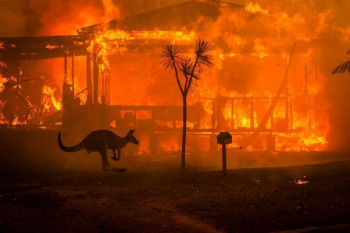We ask you, urgently: don't scroll past this
Dear readers, Catholic Online was de-platformed by Shopify for our pro-life beliefs. They shut down our Catholic Online, Catholic Online School, Prayer Candles, and Catholic Online Learning Resources essential faith tools serving over 1.4 million students and millions of families worldwide. Our founders, now in their 70's, just gave their entire life savings to protect this mission. But fewer than 2% of readers donate. If everyone gave just $5, the cost of a coffee, we could rebuild stronger and keep Catholic education free for all. Stand with us in faith. Thank you.Help Now >
Why are the fires in Australia so bad?
FREE Catholic Classes
Although overshadowed by stories of international conflict, an epic natural disaster grips Australia in the form of massive brush fires. Millions of acres of land have burned, at least 17 people are dead, and an unprecedented half-a-billion animals are lost. Koalas have been exceptionally hard-hit and experts warn they could be rendered extinct as a result of the disaster. Brush fires are common in Australia, but why are they so bad this year?

Fires continue to ravage Australia and will likely do so for months to come.
Highlights
Catholic Online (https://www.catholic.org)
1/7/2020 (5 years ago)
Published in Asia Pacific
Keywords: Australia, fires, koalas, climate change, habitat
LOS ANGELES, CA (California Network) - Australia continues to burn, with fires spreading across the entire continent. While fires are common in Australia, this season is virtually unprecedented. Australia is suffering from a perfect setup of extended drought, high winds, and extreme high temperatures.
Temperatures across much of Australia are well over 100 degrees Fahrenheit, with highs reaching 105 to 107 (41 degrees Celsius). Australia is suffering one of the worst droughts in history, with the southern half of the nation in an official drought since 2017. The worst fires are in the southeastern regions of the country, but fires are burning everywhere on the continent, from coast to coast. The soot from the fires is turning skies red even in the cities of Sydney and Melbourne.
The fires have resulted in an outpouring of international aid with firefighters sent from as far away as Canada. Fire aircraft and crews have arrived from across the Pacific to help.
Perhaps the most moving and dramatic impact of the fires has been the destruction of Australia's unique wildlife. This is not intended to diminish the severe human impact of the fires, but the images of Australian marsupials with singed fur, being cared for by veterinary experts is striking a nerve with all who see it. Expert estimates say as many as half-a-billion animals have died. Exacerbating the number of dead are the fences stretched across miles of ranchland, which prevented millions of animals from fleeing. Normally, the fences prevent animals from entering the highways, but in this case they proved to be deadly obstacles to the panicked animals.
Some scientists have claimed that the Koala population is especially hard-hit. A few have reasoned the species will be functionally extinct, at least in the wild, because their numbers and habitats have been destroyed. Koalas are famous for their picky appetite and long periods of sleep. Some are only active for minutes per day. The number of animals was most recently estimated at 80,000, but after the fires that figure will be significantly lower. Koalas are too slow to escape a fast-moving brush fire. Even fast-moving kangaroos and other animals have been wiped out by the herd.
However, it is unlikely any animals are being rendered extinct by these fires, devastating though they are. Most animals have ways of surviving, although larger ones are vulnerable.
Climate change is being identified as a culprit, but as with all climate phenomena, it is difficult to peg a single weather event to climate change. Instead, scientists refer to trends of hotter, more extreme, weather, and prolonged drought. But the chief culprit is certainly human activity. As people transform the land for living space and economic activity, they make brush fires more likely and more deadly. Tightly-packed communities are especially vulnerable, as California learned in 2018. This isn't global warming so much as a terrible critique about land management.
Nature periodically burns stretches of land. This is part of the renewal process and most plants and animals can easily cope. But as humans undermine natural processes, there are consequences to be reaped. Unfortunately, it appears all those consequences have come at once in Australia.
With summer just underway on the continent, Australians still have months to contend with hot, dry and dangerous conditions.
---
'Help Give every Student and Teacher FREE resources for a world-class Moral Catholic Education'
Copyright 2021 - Distributed by Catholic Online
Join the Movement
When you sign up below, you don't just join an email list - you're joining an entire movement for Free world class Catholic education.
An Urgent Message from Sister Sara – Please Watch
- Advent / Christmas
- 7 Morning Prayers
- Mysteries of the Rosary
- Litany of the Bl. Virgin Mary
- Popular Saints
- Popular Prayers
- Female Saints
- Saint Feast Days by Month
- Stations of the Cross
- St. Francis of Assisi
- St. Michael the Archangel
- The Apostles' Creed
- Unfailing Prayer to St. Anthony
- Pray the Rosary
![]()
Copyright 2025 Catholic Online. All materials contained on this site, whether written, audible or visual are the exclusive property of Catholic Online and are protected under U.S. and International copyright laws, © Copyright 2025 Catholic Online. Any unauthorized use, without prior written consent of Catholic Online is strictly forbidden and prohibited.
Catholic Online is a Project of Your Catholic Voice Foundation, a Not-for-Profit Corporation. Your Catholic Voice Foundation has been granted a recognition of tax exemption under Section 501(c)(3) of the Internal Revenue Code. Federal Tax Identification Number: 81-0596847. Your gift is tax-deductible as allowed by law.









